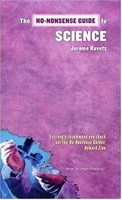Book Author: Jerome Ravetz
Reviewed by Jonathan Latham (The Bioscience Resource Project)
Traditional science as practiced in European and US universities is being confronted on many sides. These challenges are manifested in the rise of alternative medicine and patients groups, well-publicised failures and ethical lapses, criticism from environmental groups and declining student interest in many science subjects. To make matters worse, there is an increasingly cogent intellectual critique of scientific infallibility, objectivity and disinterestedness.

What should a young person do who aspires to make the world a better place and to make their way in science? A good starting point would be to read The No-Nonsense Guide to Science. It is short, sharp and it covers a lot of ground that is not normally part of the science syllabus (but that certainly should be). Starting by revisiting the history of science it focuses on what we can learn from the ongoing revision of this history. It argues, foremost, that science was never objective or disinterested but that in the past this mattered relatively little since it was relatively powerless and less wedded to establishment interests.
We have now, it argues, entered a new world of ‘mega’; that is, institutionalised and often corporate science in which these shortcomings have become all too apparent. The Guide offers an understanding of this new era that explicitly recognises the fallibility and incompleteness of scientific understanding, especially where it meets the messy and sometimes malevolent world in which real people live. Thus it takes as deadly serious the proposition of Britain’s Astronomer Royal, Martin Rees, that science is likely to be responsible for bringing the 21st Century to a premature end, at least as far as humans are concerned (1). In return, Ravetz offers the democratisation of science as a necessary and realistic antidote to its hubris and arrogance. In a year in which we have seen proposals to use the world’s oceans as fish farms and even to alter the fundamental constants of the universe (to improve the speed of computers), this is welcome thinking. Ravetz suggests that this democratisation process is steadily, even rapidly, gaining ground and that its’ general acceptance may not be so very far away.
This book would be useful to any scientist interested in thinking about the present and future relationship between science and society but who is unfamiliar with philosophy and especially sociology of science. Nevertheless, it is an overview that is primarily designed for young scientists and undergraduates. Some may be put off by the pocket guide format and there is little space for references or detailed arguments but as a primer on science that isn’t afraid of challenging ideas this guide is hard to beat.
1. Martin Rees: Our Final Century, Heinemann (2003)
ISBN: 1904456464 Publisher: New Internationalist Books (2006)
If this article was useful to you please consider sharing it with your networks.


